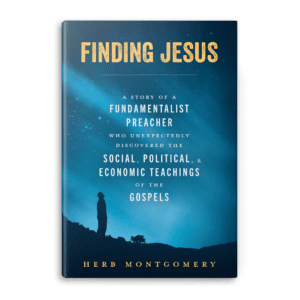
As we wrap up our discussion on a spiritual awakening that leads to justice, this helps us understand why so many sectors of Christianity focus much more on “saving souls” than working to save people from the concrete suffering and systems of injustice they are enduring in the present.
Welcome Readers! Please subscribe to Social Jesus Here.
(Read this series from the beginning at Part 1 and Part 2.)
I wish I had a nickel for every time I’ve had a Christian say to me that as Jesus followers we are to be about saving souls not social justice. The Jesus of Matthew, Mark and Luke don’t follow that rule at all
The Jesus of the synoptic gospels is all about liberating people from what they are suffering bodily, materially, and concretely in the here and now. His focus is never on liberating the soul from the body in the afterlife or leaving the body to go on suffering while the spirit longs to be free. The Jesus of the synoptics focuses instead on liberating people from injustice, violence, oppression and marginalization in the present.
The Jesus of Matthew, Mark, and Luke is very enfleshed. And the work of the spirit is to establish justice for those being presently harmed by whatever system they find themselves trying to survive.
Lastly, we encounter in this Johannine version of the Jesus story Jesus being likened to the serpent in the wilderness. In early Jewish and Christian Gnosticism and in later Gnosticism, the serpent was praised and thanked for bringing knowledge (gnosis) to those trapped in the material existence of suffering. The serpent was the liberating savior and bestower of this knowledge (gnosis). The serpent also became a symbol of healing and appears around the Rod of Asclepius, the symbol of medicine. Many in Jewish Gnostic, non-rabbinic circles interpreted the story of Moses lifting up the serpent in the wilderness through these lenses.
This is the context in which our reading this week was written. Like the healing serpent, Jesus comes to the Johannine community bringing knowledge (gnosis) to those of us who are trapped in our material suffering. Jesus, like that serpent, is the liberating savior pointing toward a salvation of our souls from our bodies through obtaining knowledge (gnosis) (see John 17:3).
Like those early believers, I also argue for a Jesus who liberates—but through teachings that enable us to establish justice in the here and now, not by demonizing our flesh and then offering a post-mortem liberation of our souls from our bodies.
Lastly, in these Jewish and Christian ways of interpreting the serpent in the wilderness, there is nothing substitutionary about the serpent on the bronze pole or Jesus being lifted up on a Roman cross. The Roman cross merely lifted Jesus up or brought attention to him so that many could discover the knowledge (gnosis) he came to give to liberate their spirits from material captivity.
Honestly, I find all of this deeply problematic. The binary contrast of flesh and spirit quickly becomes an opiate for our world’s injustice and does not inspire us to get to work creating change. For proto-Gnostics, Jesus’ crucifixion was the moment his spirit was liberated from his body, not the state-sponsored injustice that it actually was. In that tradition, the resurrection has to be interpreted in some other way than as God’s reversing, overcoming, and undoing everything accomplished through Jesus death and causing Jesus teaching to live on.
A more life-giving definition of atonement for me is making something that has fragmented whole or one again. This is where the teaching of Jesus come in: they call listeners to practice justice, compassion, and inclusion, and to speak against marginalization.
I would use the language of being “born again” differently than those early believers did, but I do believe we also need to experience a type of epiphany, a paradigm shift, an awakening that helps us understand we’ve been programmed by the systems of injustice we are living under in this beautiful world. It doesn’t matter whether we call it being born again, becoming “woke,” or just coming to view the world differently than those benefiting from the status quo would have us operate within. To quote Michelle Alexander, author of The New Jim Crow, “Without a moral or spiritual awakening, we will remain forever trapped in political games fueled by fear, greed and the hunger for power.” (via RadicalDiscipleship.net, September 18, 2016)
I believe the teachings of Jesus still offer us a path toward that spiritual awakening, even today.
 Herb’s new book, Finding Jesus: A story of a fundamentalist preacher who unexpectedly discovered the social, political, and economic teachings of the Gospels, is now available at Renewed Heart Ministries.
Herb’s new book, Finding Jesus: A story of a fundamentalist preacher who unexpectedly discovered the social, political, and economic teachings of the Gospels, is now available at Renewed Heart Ministries.














